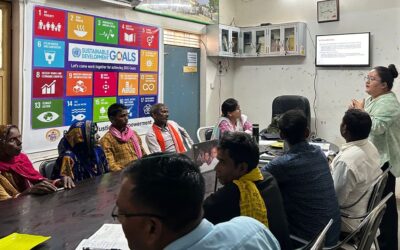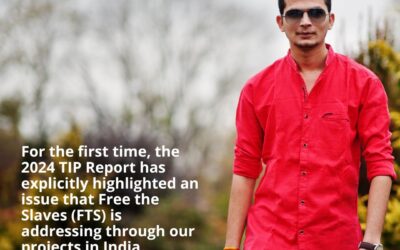Free the Slaves partner in Nepal, WOSCC (The Women Skill Creation Centre) works to rehabilitate women returned from slavery. Many of the women who come to WOSCC are survivors of circus slavery in India.
Life in the circus can be horrifying for these enslaved young women. Ginny Bauman, Free the Slaves Director of Parnterships, spoke with a group of women, ages 18-24, who had returned after years of slavery in India’s circuses. Ginny’s reflections on this conversation were written in a case study, focusing on one survivor: Rama*. Here is an excerpt:
The names of the circuses speak of the glamour and excitement they hoped for: the Golden Star, the Empire, the Western. Now they have returned home to villages like this one, reached only by foot, without electricity, between towering majestic hills . . .
Rama’s hopes of a glittering life in the circus were painfully short-lived. The girls survived on a sparse diet of dal and rice, and they trained and performed from 9am to 2am each day. All these girls were caught between the fear of being kicked and beaten if they showed any resistance, and the terror of the acts they were forced to learn. Rama explained that on the high wire, they used a safety net during practices, but at performances, there was nothing to save her if she fell. The other girls spoke of horrific injuries: a boy tied inside a rotating wheel who fell out and died; a girl who fell and snapped her thigh bone. Rama herself had three serious injuries including blows to the head.
(Read more here: “Rehabilitating Enslaved Circus Performers in Nepal”).
Hopefully, the recent decision of India’s Supreme Court to prohibit circuses from employing children under 14-years of age will prevent more children from suffering Rama’s fate. This landmark decision followed the tireless work of the Save the Childhood Movement advocating for the “full implementation of Indian child labour laws, which are regularly flouted by circuses.”
From an article on Dawn.com:
Children are often trained to perform high-wire acrobatic acts, juggling stunts and other attractions for audiences in India, where circus companies move from town to town throughout the year.
‘The court has ordered the government to rescue all children below 14 years of age and also instructed them to formulate a rehabilitation policy for the minors,’said Colin Gonsalves, a lawyer for the Save the Childhood Movement, which brought the case.
The court order said that all children rescued from circuses should live with their parents and that the government should provide care and education if their parents are unable to look after them. Read More >>
Circus owners are already protesting the high court’s decision, claiming that the only way for them to train circus performers is to begin their education at an early age. A trainer at a Gujarat-based circus said: “[o]ne can only perform acrobatics if rigorous training is imparted at an early age. Children are needed for the job and you cannot train adults for it.” The Indian circuses are also highlighting the practices of European circuses, which allow children performers to be hired if “one parent accompanies them and full education is provided.”
Find out more about our partner organizations in Nepal. And donate today, to help ensure that FTS and our frontline partners can continue our work.
*Name has been changed to protect her identity



